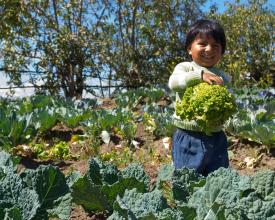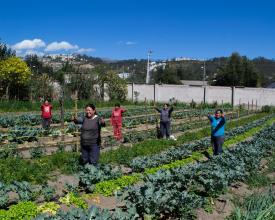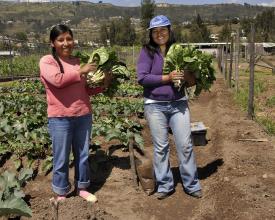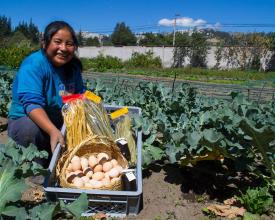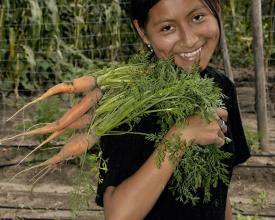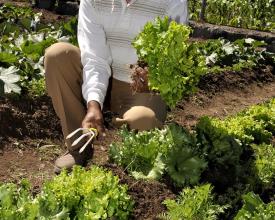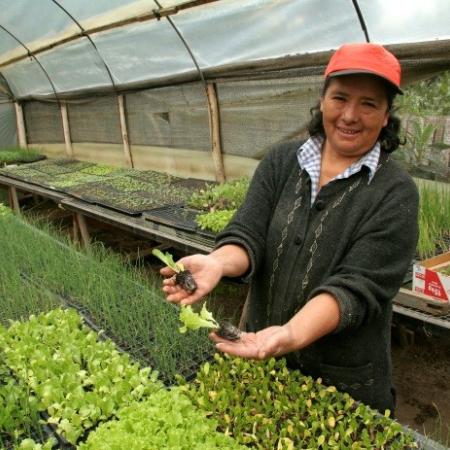
Programme d'agriculture urbaine participative de Quito (AGRUPAR)
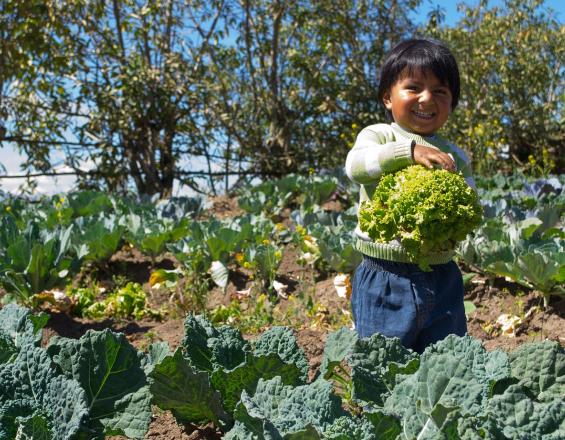
AGRUPAR a été développé sur la base d'une large consultation communautaire. Il reconnaît explicitement le rôle de l'agriculture urbaine dans le développement social, écologique et économique au sens large, et travaille tout au long de la chaîne alimentaire. Des programmes de formation aident à soutenir les jardins communautaires, familiaux et scolaires. Avec plus de 3 600 jardins urbains cultivés sur 32 hectares et plus de 21 000 personnes formées, AGRUPAR favorise la sécurité alimentaire, augmente les revenus et améliore les fonctions de l'écosystème. Ses participants produisent désormais plus de 870 000 kg de produits alimentaires par an pour la ville et plus de 6 600 foires biologiques ont été organisées à ce jour. Le programme s'inscrit dans la mission de Quito de devenir une ville entrepreneuriale, durable et innovante. En raison de son impact socio-économique et environnemental impressionnant, et de son approche participative et holistique, AGRUPAR a été récompensé par le Future Policy Silver Award 2018, décerné par le World Future Council en partenariat avec la FAO et IFOAM - Organics International.
Contexte
Défis à relever
Entre 1980 et 2000, les vagues d'arrivée de migrants en provenance d'autres régions du pays ont presque doublé la population de Quito, qui est passée de 780 000 à 1,4 million d'habitants. Dans les barrios (quartiers) du centre-ville et dans les établissements construits sur les collines environnantes, de nombreuses personnes ont eu recours à l'agriculture à petite échelle, basée sur des pratiques conventionnelles, pour nourrir leurs familles. Cela signifie que l'agriculture urbaine à Quito s'est répandue, mais n'a pas été reconnue. En raison de sa position géographique et de sa topographie montagneuse, Quito est très vulnérable aux changements climatiques. La ville connaît déjà des températures moyennes plus élevées, une diminution générale des précipitations et des événements pluvieux plus extrêmes, qui provoquent des glissements de terrain. À la fin des années 1990, l'Équateur a connu une grave crise économique qui a entraîné une forte baisse des dépenses publiques et une augmentation des migrations internes et de l'émigration. En 1999, 48 % de la population de Quito vivait en dessous du seuil de pauvreté. La ville devait s'attaquer d'urgence au problème du surpeuplement et de l'insécurité alimentaire.
Emplacement
Traiter
Résumé du processus
Le soutien au jardinage urbain, communautaire et institutionnel pour la consommation domestique et la vente des restes (BB1) est la base principale du soutien à la production locale orientée vers le marché dans la région du DMQ (BB2), de l'approvisionnement et de la distribution alimentaires (BB3), et de la promotion de la consommation alimentaire, des régimes alimentaires sains et de la nutrition par le biais de foires biologiques et de l'éducation (BB4). Ensemble, ces éléments constituent le potentiel d'un modèle transférable (BB5).
Blocs de construction
Soutien au jardinage urbain, communautaire et institutionnel pour la consommation domestique et la vente des restes.
Les personnes sont formées à la production biologique, aux techniques de gestion, à la nutrition, à la transformation des aliments et à la commercialisation. AGRUPAR fournit aux producteurs des semences, des plants, des volailles, des cochons d'Inde, des abeilles, des intrants et des équipements. Elle soutient les jardins communautaires, les jardins familiaux et les jardins dans les écoles et autres institutions, ainsi que les petites unités de production animale. Il encourage également l'agriculture verticale. Les jardins communautaires sont établis sur des terres communales ou sur des terres que la municipalité loue pour un prix minimal aux cultivateurs, et reçoivent une certification biologique de l'AGRUPAR, tandis que les jardins familiaux sont établis sur des terres appartenant à des particuliers. Il convient de noter que l'AGRUPAR ne délivre pas de titres fonciers officiels. En 2018, AGRUPAR prévoyait d'ouvrir 200 jardins supplémentaires.
Facteurs favorables
- L'AGRUPAR fournit la formation et les intrants
- L'AGRUPAR met à disposition des terres communales ou des terres louées à la municipalité.
Leçon apprise
Tous les vergers n'ont pas besoin d'une certification biologique officielle, par exemple les vergers destinés à l'autoconsommation familiale n'ont pas besoin de ce processus. C'est pourquoi le projet a mis en place un système de contrôle interne (SIC, qui ressemble beaucoup à un système de garanties participatives) pour tous les vergers (certifiés ou non) afin d'assurer le respect de la réglementation équatorienne en matière de production biologique.
Soutien à la production locale orientée vers le marché dans la région DMQ
Une fois que les producteurs ont atteint la sécurité alimentaire du ménage, AGRUPAR les encourage à créer des microentreprises et les forme à la planification d'entreprise, au marketing et à la comptabilité. Les micro-entreprises sont non seulement engagées dans la production de légumes, de fruits, de petits animaux, de poissons et de plantes ornementales, mais aussi dans la transformation de confitures, de biscuits, de yaourts, de fromages, de boissons et d'en-cas traditionnels, et elles fournissent également des produits à des entreprises locales de transformation alimentaire ou à des restaurants.
Facteurs favorables
- AGRUPAR propose des formations sur les compétences liées à l'esprit d'entreprise.
- Les producteurs qui ne disposent pas du capital nécessaire sont soutenus par des sociétés d'investissement locales, où chaque membre contribue à hauteur de 10 à 20 USD.
Leçon apprise
En plus de renforcer la sécurité alimentaire, AGRUPAR améliore les revenus des groupes vulnérables. La moitié des participants génèrent des revenus et des emplois. Environ 177 ont créé des entreprises, dont 104 sont formalisées. En moyenne, leurs revenus s'élèvent à 3 100 USD par an et, depuis 2016, ils ont créé 337 emplois. En moyenne, les producteurs bénéficient de 175 USD de revenus supplémentaires par mois. L'épargne totale est plus de trois fois supérieure à la valeur du bon de développement humain du gouvernement (50 USD par mois). Toutefois, la plupart des 480 participants interrogés en 2010 ont déclaré que l'amélioration de la qualité de vie, de la nutrition et de la santé, ainsi que l'autonomisation personnelle étaient encore plus importantes pour eux. Il convient de noter qu'AGRUPAR est très bien accepté par ses bénéficiaires (plus de 91 %).
Approvisionnement et distribution de denrées alimentaires
Les aliments sont vendus dans des marchés de produits biologiques - les bioferias - situés dans des quartiers à faibles revenus et des zones périurbaines, ainsi que dans des quartiers plus aisés de la ville. Par ailleurs, l'agence de coordination du commerce du district a commencé à envisager la commercialisation à grande échelle d'aliments agro-écologiques et biologiques sur ses marchés et a ouvert un premier marché de ce type, notamment pour les agriculteurs soutenus par AGRUPAR. Pour aider les producteurs à respecter les normes de qualité et de sécurité alimentaire, l'AGRUPAR a introduit des technologies de transformation améliorées et l'utilisation de conteneurs, d'emballages et d'étiquettes. L'AGRUPAR est enregistrée en tant que producteur et négociant de produits biologiques au niveau national, ce qui lui permet de partager le coût de la certification des produits avec les producteurs participants.
Outre les foires biologiques, des réseaux d'agriculteurs sont également constitués pour livrer des paniers de produits biologiques directement aux producteurs et aux hôtels ou restaurants qui vendent des aliments traditionnels. AGRUPAR est enregistré en tant que producteur et négociant de produits biologiques au niveau national et partage le coût de la certification des produits avec les producteurs.
Facteurs favorables
- Pour garantir la qualité de la production, les foires biologiques ne sont ouvertes qu'aux producteurs qui ont suivi le programme.
- Outre les foires biologiques, des réseaux d'agriculteurs ont été constitués pour livrer des produits biologiques directement aux entreprises locales de transformation alimentaire ainsi qu'aux hôtels et aux restaurants.
- Afin de garantir la plus grande disponibilité et la plus grande consommation possible d'aliments biologiques, les foires bio
sont situées dans des quartiers à faibles revenus et des zones périurbaines.
Leçon apprise
Aujourd'hui, les participants d'AGRUPAR produisent annuellement plus de 960 000 kg de produits alimentaires. Près de la moitié de la production (47 %) est utilisée pour la consommation domestique, renforçant ainsi la sécurité alimentaire et diversifiant le régime alimentaire des 12 000 agriculteurs urbains participants et de leurs familles, tandis que l'autre moitié est commercialisée. Le programme a créé 17 foires biologiques où 105 types d'aliments sont proposés. Grâce à ces foires, 25 % des produits sont commercialisés, pour un montant d'environ 350 000 USD par an. Depuis 2007, un total de 6 663 foires biologiques ont été organisées et tous les produits sont biologiques. La certification biologique formelle pour les vergers ayant des possibilités de commercialisation (depuis 2007) et le système de contrôle interne (SIC, depuis 2013) sont tous deux utilisés. En 2010, le programme avait créé cinq associations de producteurs, ce qui a permis d'améliorer les possibilités de commercialisation des produits.
Promotion de la consommation alimentaire, des régimes alimentaires sains et de la nutrition par le biais de foires biologiques et de l'éducation
Grâce aux foires biologiques et à d'autres activités, AGRUPAR promeut une alimentation saine et la durabilité. Le programme a créé 17 foires biologiques où 105 types d'aliments sont proposés. Grâce à ces foires, 25 % des produits sont commercialisés, pour un montant d'environ 350 000 USD par an.
Facteurs favorables
- Depuis 2007, 6 663 foires bio ont été organisées.
- Tous les produits sont biologiques.
Leçon apprise
Près de 170 000 consommateurs ont assisté aux foires biologiques et ont été sensibilisés aux régimes alimentaires sains et à la nutrition. Des enquêtes ont révélé une plus grande diversité alimentaire chez les producteurs et leurs familles.
Le potentiel d'un modèle transférable
AGRUPAR pourrait bien servir de modèle à d'autres villes et constituer la base d'une politique nationale en matière de production locale.
CONQUITO a favorisé les voyages d'observation et les échanges d'expériences ainsi que le transfert de méthodologies, y compris entre les ministères et les ONG, par exemple le ministère de l'agriculture, de l'élevage, de l'aquaculture et de la pêche et le Peace Corps.
Depuis 2015, AGRUPAR a contribué au projet City Region Food Systems de la FAO et de la Fondation RUAF, qui a évalué le système alimentaire de Quito. En conséquence, le personnel d'AGRUPAR a décidé de travailler à une politique alimentaire pour la ville dans un sens plus systémique, au sein de laquelle l'agriculture urbaine est une activité stratégique.
Facteurs favorables
- L'engagement de la municipalité à poursuivre et à investir dans le programme à long terme
- Une équipe formidable
- L'adhésion de CONQUITO
Leçon apprise
Au cours de ses 16 années d'existence, AGRUPAR a obtenu des résultats impressionnants. Ces résultats ont contribué à en faire un exemple internationalement reconnu d'agriculture urbaine participative exemplaire et servent désormais de référence pour tous ceux qui suivent son chemin.
Impacts
Au cours de ses 16 années d'existence, AGRUPAR a obtenu des résultats impressionnants. En 2018, il touche chaque année 4 500 bénéficiaires issus de populations très vulnérables et couvre 83 % du district. Depuis sa création, le programme a : bénéficié directement à 73 936 personnes et aidé indirectement 113 774 autres ; mis en œuvre un total de 3 679 jardins urbains, couvrant 32 hectares, dont 60 % sont des jardins familiaux et 26 % sont gérés par 380 groupes organisés (avec 1 520 participants) ; incorporé 21 746 personnes dans des formations, dont 84 % de femmes ; organisé 16 172 formations techniques et 81 886 cas d'assistance technique ; et construit 2 051 infrastructures productives (1 072 micro-serres et 979 systèmes d'irrigation au goutte-à-goutte).
Aujourd'hui, les participants d'AGRUPAR produisent annuellement plus de 960 000 kg de produits alimentaires. Près de la moitié de la production (47 %) est utilisée pour la consommation domestique, ce qui renforce la sécurité alimentaire et diversifie le régime alimentaire des 12 000 agriculteurs urbains participants et de leurs familles, tandis que l'autre moitié est commercialisée. Le programme a créé 17 foires biologiques où 105 types d'aliments sont proposés. Grâce à ces foires, 25 % des produits sont commercialisés, pour un montant d'environ 350 000 USD par an. Depuis 2007, un total de 6 663 bio-foires ont été organisées et tous les produits sont biologiques. En outre, 48 banques communautaires ont été créées pour fournir des services de crédit aux participants.
Bénéficiaires
Au cours de ses 16 années d'existence, AGRUPAR a bénéficié directement à 73 936 personnes et indirectement à 113 774 autres. En 2018, elle touche chaque année 4 500 bénéficiaires issus de populations très vulnérables.
Objectifs de développement durable
Histoire

L'une des histoires qui abondent et qui reflètent le caractère unique d'AGRUPAR est sans doute le témoignage de centaines de femmes qui se sont émancipées. Selon les statistiques, plus de 84 % des participants à AGRUPAR sont des femmes. Certaines ont adhéré il y a dix ans, d'autres récemment ; il y a des producteurs qui frôlent les 70 ans et d'autres qui en ont 22. Au-delà de ces nuances, tous partagent un sentiment de satisfaction pour les résultats obtenus.
"L'amour de la terre, des plantes, de la nature, le fait de ne pas avoir à craindre de se salir les mains avec la terre, c'est ce qui me fait adhérer à l'agroécologie", déclare Gloria Rosero, l'une des plus anciennes agricultrices urbaines de Quito. "J'ai mon jardin, j'y plante avec ma famille, nous récoltons et transformons, non seulement les aliments, mais aussi la vie des gens qui les consomment. Aujourd'hui, nous vendons dans les bioferias, les consommateurs me connaissent déjà et sont très reconnaissants, car les aliments sains ont changé leur vie. L'une de mes réalisations a été la mise en place d'une micro-entreprise de germination de semences, grâce à laquelle je soutiens d'autres agriculteurs AGRUPAR et garantis un revenu à ma famille. Je suis la pionnière des femmes qui ont trouvé un mode de vie dans l'agriculture urbaine de Quito. "

